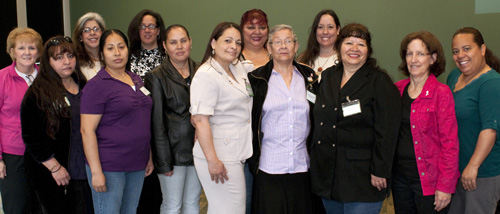Christiana Care promotes breast health to Latinas through promotoras


Through Christiana Care, Latinas are learning about breast health and cancer screenings, essential information they can share with others as “promotoras”—promoters of health education—to Delaware’s rapidly growing Hispanic community.
“If you teach someone, then ask her to go talk to her family, her community, you raise awareness that cancer is not a death sentence,” says Nora Katurakes, RN, MSN, OCN, Christiana Care’s manager οf Community Health Outreach and Education.
Josefina Hernandez, 51, knows firsthand how important it is to get an annual mammogram. Her regularly scheduled screening detected Stage 1 breast cancer, an early form of the disease that is highly treatable.
“I would have never found out that I had cancer if I hadn’t had my mammogram,” she says. “Now, I tell my kids, my sisters, my family, so that they will know.”
At a recent workshops at the Helen F. Graham Cancer Center and Woodlawn Library, Hernandez and other promotoras-in-training learned facts about breast health and the effectiveness of early detection and treatment in saving lives.
“Culturally, Latinas don’t see a need to go the doctor’s unless we are sick,” says Sharon Gomez, outreach coordinator. “Through the promotoras, we are emphasizing screenings that can detect a problem before someone feels sick.”
Among Hispanic women, breast cancer is the leading cause of cancer death, according to the American Cancer Society (ACS). Hispanic women are 20 percent more likely to die from breast cancer than non-Hispanic white women diagnosed at the same age, often because the cancer is diagnosed at a later stage, according to ACS Cancer Facts. Within the past year, 41.7 percent of Hispanic women had a mammogram, compared to 53 percent of non-Hispanic white women.
Throughout the year, Christiana Care’s outreach staff works with Hispanics and people in other underserved communities to make health care more accessible.
“We frequently get calls from people who do not have insurance and others who do not have primary-care physicians, asking if they can get help,” says Joceline Valentin, a bilingual outreach coordinator at the Community Outreach and Education program at the Helen F. Graham Cancer Center. “We tell them ‘yes,’ and that we will meet them at appointments to interpret.”
The Community Health Outreach and Education Department obtained a grant for a lay health educator program from the American Recovery and Reinvestment Act through the NCI National Community Cancer Centers Program. The two-year grant pays for a full-time bilingual community outreach worker. Susan G. Komen for the Cure Philadelphia affiliate also pays for a bilingual outreach coordinator.
In addition to the promotoras, the program includes training medical assistants at federally qualified clinics to promote screenings, starting with breast health and eventually including tests for cervical and colon cancer.
“Our goal is to have 300 people receive screenings as a result of this program,” Katurakes says. “Each one of the promotoras represents a connection in a family network who can reach others we might not otherwise have an opportunity to help.”
Photo gallery: Training promotoras
Error fetching Flickr photos: A feed could not be found at `https://api.flickr.com/services/feeds/photoset.gne?lang=en-us&format=feed-rss_200&nsid=28142983@N07&set=72157627293336132&per_page=50`; the status code is `404` and content-type is `text/html; charset=UTF-8`